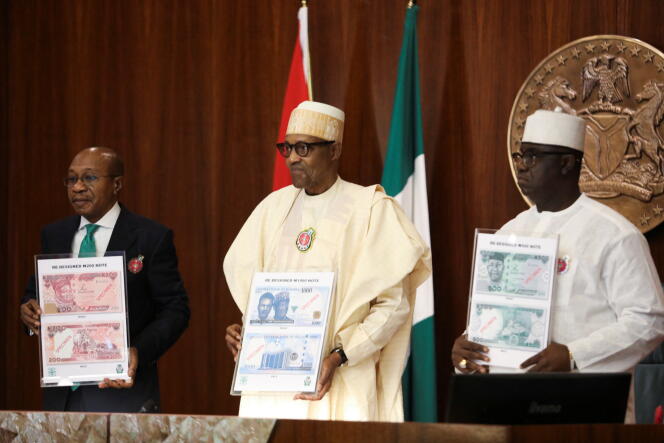
With less than three weeks to go before the presidential election, the queues that had already been stretching outside gas stations for several months have now spread to ATMs in Nigeria. Since the Central Bank of Nigeria (CBN) decided at the end of October 2022 to replace all the naira in circulation with new notes by January 31, cash has been in short supply in Africa's most populous country.
The measure, which is currently the subject of numerous legal challenges, was intended to control inflation, curb money laundering and limit vote buying. But its implementation has been extremely chaotic.
While retailers began refusing to accept old bills in January, some banks continued to distribute them to their customers due to the lack of an alternative. Beset by criticism, the CBN announced on January 29 that it would extend the validity of the old notes to Friday, February 10. However, many Nigerians have already taken their naira back to the bank and the new bills are almost impossible to find.
At the "Point of Sale" (POS) machines, the bank terminals that represent an alternative to traditional banks for a majority of Nigerians, people have to pay exorbitant fees to withdraw the new naira, under the pretext that the operators themselves pay "a lot of money" to obtain these bills.
Saturation of banking applications
The banks, inundated from dawn, only open their doors for short periods to avoid being overwhelmed. Some even advise their employees not to come to work in uniform, due to the risk of harassment in the street. Withdrawals from official ATMs are severely limited, sometimes to only 2,000 nairas per person.
In the absence of cash, Nigerians have turned to banking applications en masse, which quickly led to network saturation. It has become difficult to transfer funds or pay by card in the country, even in the major cities. Inhabitants of the border areas of Niger, Benin and Cameroon now prefer to use CFA francs. The lack of ATMs in the most remote parts of the country further increases the difficulty of obtaining new bills, as nearly 40% of the Nigerian population simply does not have access to the banking system.
After a meeting with governors on February 3, President Muhammadu Buhari pledged to find a solution to the shortage within seven days. This is an intolerable delay for the population, already suffocated by inflation and the naira's fall. At the same time, protests broke out in Oyo, Delta, Osun and Lagos states in southern Nigeria, where ATMs were vandalized. In Ibadan, students and security forces clashed near the local university. Further demonstrations took place on February 7 in southwestern Nigeria: in Abeokuta, the capital of Ogun state, and in Akure, the capital of Ondo state.
Accusations of trying to disrupt the elections
The anger is all the greater because the country has already been affected by a fuel shortage since November, the causes of which remain unclear. The Nigerian National Petroleum Company (NNPC) initially explained that trucks were having trouble getting through because of the devastation caused by the historic floods that hit the country during the rainy season. But the bad weather has stopped and yet gasoline is still in short supply.
Both the NNPC and the central bank and its powerful governor have been accused of trying to disrupt the elections. Although he's a member of the outgoing majority, Bola Tinubu, the candidate of the All Progressives Congress (APC), was the first to express concern. "They don't want the elections to take place but we won't accept this," he said at a rally in the town of Abeokuta in late January.
A few days later, the governor of Kaduna state – also a member of the majority – publicly suggested that "elements" within the presidential palace were working against Tinubu's candidacy. Tinubu has not hesitated to criticize the incumbent president personally in his speeches. Perhaps this is a way of subtly distancing himself from his more than mixed record on the economic and security fronts.
Promises of solutions
Over the weekend, the official opposition issued a statement accusing Tinubu of orchestrating the collection of new banknotes to serve "his selfish agenda." The People's Democratic Party (PDP) suggested that the APC decided to replace banknotes on the eve of the presidential election in order to steal them. The PDP said it was "disgusted by the hypocrisy displayed by the APC candidate who, despite his alleged role in the cash shortage, is making accusations and seeking to use the situation (...) to disrupt the general election."
The Central Bank governor, Godwin Emefiele, attempted to dispel these accusations during a February 7 meeting with the chairman of the electoral commission. Emefiele noted that emergency situations "may arise requiring immediate cash payments. Some of the critical service providers are unbanked." In return, the CBN boss pledged that the money needed for the electoral commission's operations would be available immediately.
Similarly, a logistical solution seems to have been found in consultation with the Nigerian National Petroleum Company to deal with the shortage of gasoline during the election period. "Be rest assured that the elections will hold as scheduled on February 25 for the national and on March 11 for the state elections," promised the chairman of the electoral commission on February 8.